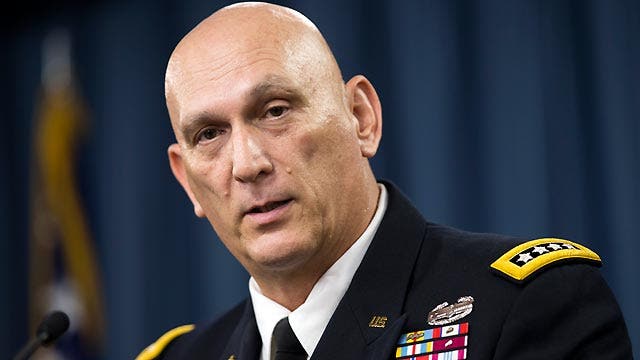General Raymond T. Odierno, who spent more time in Iraq as a commanding general than anyone in the U.S. military, retired Friday as the 38th Chief of Staff of the United States Army.
“I feel like I've been the luckiest man in the world to serve the army for 39 years alongside incredible soldiers of tremendous courage, dedication and commitment,” Odierno told friends, family, West Point classmates and most of all, his soldiers during a retirement ceremony at Ft. Myer in Arlington, Va.
Odierno was the first to announce that Saddam Hussein was captured in Tikrit on Dec. 14, 2003.
As division commander in Iraq, Odierno’ s 4th Infantry Division went door to door trying to find the Iraqi leader for eight months following the 2003 invasion before discovering him in an underground hole
History will also remember him as a key architect of the surge, along with General David Petraeus.
That was 12 years ago. At the time, Odierno had a reputation for being an overly aggressive commander as his troops kicked down doors and rounded up Iraqi men in an attempt to stem a nascent insurgency.
They had one of the toughest assignments in Iraq: Saddam's hometown of Tikrit. Critics say their actions may have fueled the sectarian civil war and uprising that followed the U.S. invasion.
Military historian Tom Ricks, author of "Fiasco: The American Military Adventure in Iraq," who later revised his initial criticism of Odierno, wrote in the Washington Post in 2009, “"[I]f Petraeus...was the public face of the troop buildup, he was only its adoptive parent. It was Odierno...who was the surge's true father."
As he stepped down, the Army chief who started his career playing football and baseball at West Point, reflected on the lessons he learned during his four years in Iraq.
“I learned over the last 10 years or so, is that there are limits with military power,” Odierno told a news conference. “The problem we've had, is we've had outcomes, but they have been only short-term outcomes.”
In 2007 he took Fox News’ Jennifer Griffin to the front lines.
A few months earlier he appealed for more troops to his higher ups, working with retired Vice Army Chief Gen Jack Keane who lobbied the White House for the surge - a counterinsurgency strategy that required convincing then President Bush to overrule his top generals and send 20,000 US troops to stamp out the insurgency.
“Gen. Odierno, from the moment he took command, knew that the plan that Gen. Casey and Gen. Abizaid had, that strategy which was being executed, was failing and it was doomed to complete failure,” said retired Gen. Jack Keane, former Vice Chief of Staff of the United States Army in an interview with Fox News.
When Odierno finally left Iraq, he told reporters "sectarian violence is almost zero." That was September 2010.
A year later, all U.S. troops were pulled out of Iraq. Less than three years later, ISIS was born.
When he looks back on the last 12 years in Iraq, and the rise of ISIS, Odierno said he is frustrated by what he sees.
"When I think about it, a lot of hard work went into that. We thought we had it going exactly in the right direction, but now to watch it fall apart, it’s frustrating," he said in an exclusive interview with Fox News.
Based on his experience in Iraq, Odierno said he wants his time leading the Army to be remembered for changing how future leaders will be trained.
“I have adjusted how we train leaders because the world we live in today is so much more complex than it used to be and so much more difficult we have to have leaders that are comfortable in chaos,” he said.
Married to his high school sweetheart Linda, Odierno has three children: Katie, Mike and Tony.
Tony graduated from West Point in 2001 and while serving in Iraq years later, lost his left arm when a grenade was fired at his vehicle near the Baghdad airport.
Odierno doesn't like talking about his son's injury, knowing how many families lost sons and daughters during the past 14 years of war.
He has long supported the Department of Defense’s Warrior Games, an annual competition for wounded veterans held each year. His son Tony completed two triathlons after being injured and now chairs the Wounded Warrior Project.
During his farewell address, Odierno thanked his wife for sacrificing her life to be by his side.
“Over the last 15 years, Linda attended over 500 memorial services,” said Odierno. “Most of the time, I was not there because I was deployed, but she was there for our families.”
When asked how he wanted to be remembered, Odierno, as always, put the soldiers first.
"I was a chief who cared about his soldiers, who cared about the Army and the future,” he replied.





